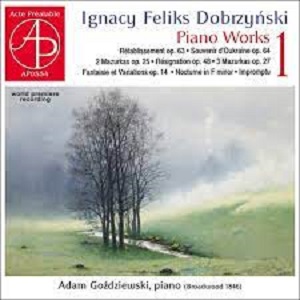
Ignacy Feliks Dobrzyński (1807-1867)
Piano Works – Volume 1
Impromptu in A-flat major (pub.c.1881)
Souvenir – two Mazurkas Op 25 (c.1834)
Souvenir d’Oukraine; Morceau Caracteristique in A minor Op 64 (pub.1856)
Trois Mazurkas Op 27 (c.1834)
Nocturne in F minor (pub.1868)
Grande Valse – rétablissement in E-flat major Op 63 (before 1852)
Résignation in A-flat major Op 48 (c.1846)
Fantaisie et Variations dans le style facile et brillant sur la mazure (kujawianka) in G minor Op 14 (c.1830)
Adam Goździewski (piano)
rec. 2022, Państwowa Szkoła Muzyczna I Stopnia im. Witolda Lutosławskiego w Zambrowie, Poland
Acte Préalable AP0554 [60]
There are many forgotten Polish composers who were contemporaries of Chopin and Acte Préalable has probably done more than any company to make these voices heard with their Chopin’s Disciples series and other releases. None have approached Chopin’s genius, but there has been much to enjoy along the way and that certainly is true of the piano music of Ignacy Feliks Dobrzyński. Born into a musical family in Volhynia, western Ukraine, his early studies were in what is now Vinnytsia and this is where he wrote his first compositions including an excellent early piano concerto (available on Fryderyk Chopin Institute NIFCCD108) and a concert overture. He studied privately with Chopin’s teacher Józef Elsner before entering Warsaw’s Main School of Music in the same year as Chopin. Though the two had different compositional priorities – Dobrzyński’s catalogue includes two symphonies, chamber works, several choral works, an opera, the Filibuster, and concertante pieces for piano, violin, bassoon and trombone – there are hints of Chopin from the very first work in this recital. The sinuous lines of the elegant waltz-like Impromptu in A-flat are characteristic of Dobrzyński’s younger compatriot, though it does not share the dramatic contrasts of Chopin’s impromptus. There are elements of the waltz in Dobrzyński’s mazurkas too, especially the central section of the second of the Op 25 mazurkas. Dobrzyński wrote about fifteen of these Polish dances and though they are not the miniature tone poems that Chopin created they are melodious, beautifully crafted and do not suffer in comparison; the third of the Op 27 mazurkas in particular has a melancholy charm that would grace any recital. The Nocturne in F minor opens with a long section in the minor, a repeated triplet accompaniment underlying the cantilena melody with some quite decorative figuration. Just as you think it is finished a new section opens in the major key, though the mood remains restrained. The booklet describes Resignation as one of his last works and it appears that Dobrzyński wrote little for the piano in his later years, instead concentrating on chamber and choral music, including a Funeral March for Chopin for mixed chorus and orchestra. As is becoming clear the spirit of Chopin is not far away in much of Dobrzyński’s piano music; one can hear it both harmonically and in the dramatically contrasted sections of the nocturne-like Resignation and in some of the figuration of the grand Rétablissement, a connected series of waltzes in extrovert, brilliant style.
The booklet is silent about the Souvenir of Ukraine other than it was published in Warsaw in 1856. After a short introduction, we hear the folk-like theme presented in a suitably straightforward manner. It undergoes some variations with the addition of filigree decoration, but the most notable variation is the agitated central section announced by sudden accented chords. The passagework here is developed from the rhythmic element of the theme and reminds one of the sort of writing found in the Parisian salons by the likes of Thalberg, Hummel or Mendelssohn in his more extravagant moments. The opening mood returns and the piece is rounded off with a gently calming coda. Adam Goździewski ends his first exploration of Dobrzyński’s piano works with a Fantaisie et variations, very much in the style of the day. Opening with a slow extended introduction and a melancholic theme in G minor, it soon arrives at the G major Kujawiak theme of the title which is then followed by dazzling variations; fast triplets and repeated notes are amongst the arsenal of virtuoso tricks on display here. The G minor theme is not ignored – it returns to provide relief from the fireworks before the thrilling bravura finale.
Acte Préalable have already made inroads into the music of Dobrzyński with releases of his Chamber music (AP0048 review, AP0067, AP0278 review and AP0279 review) and it is good to see that the piano works are now being brought back to life. It would appear that pianist Adam Goździewski is as enthusiastic about this project as is label founder Jan Jarnicki and his performances are excellent, glittering in the brilliance of the earlier works and with a sure sense of line and subtle rubato in the shorter dances and nocturnes. It was his decision to use a period piano, an 1846 Broadwood, and whilst I would normally steer clear of historic instruments in this case the sound is attractive and is captured well. An excellent first volume.
Rob Challinor
Availability: Acte Préalable

















